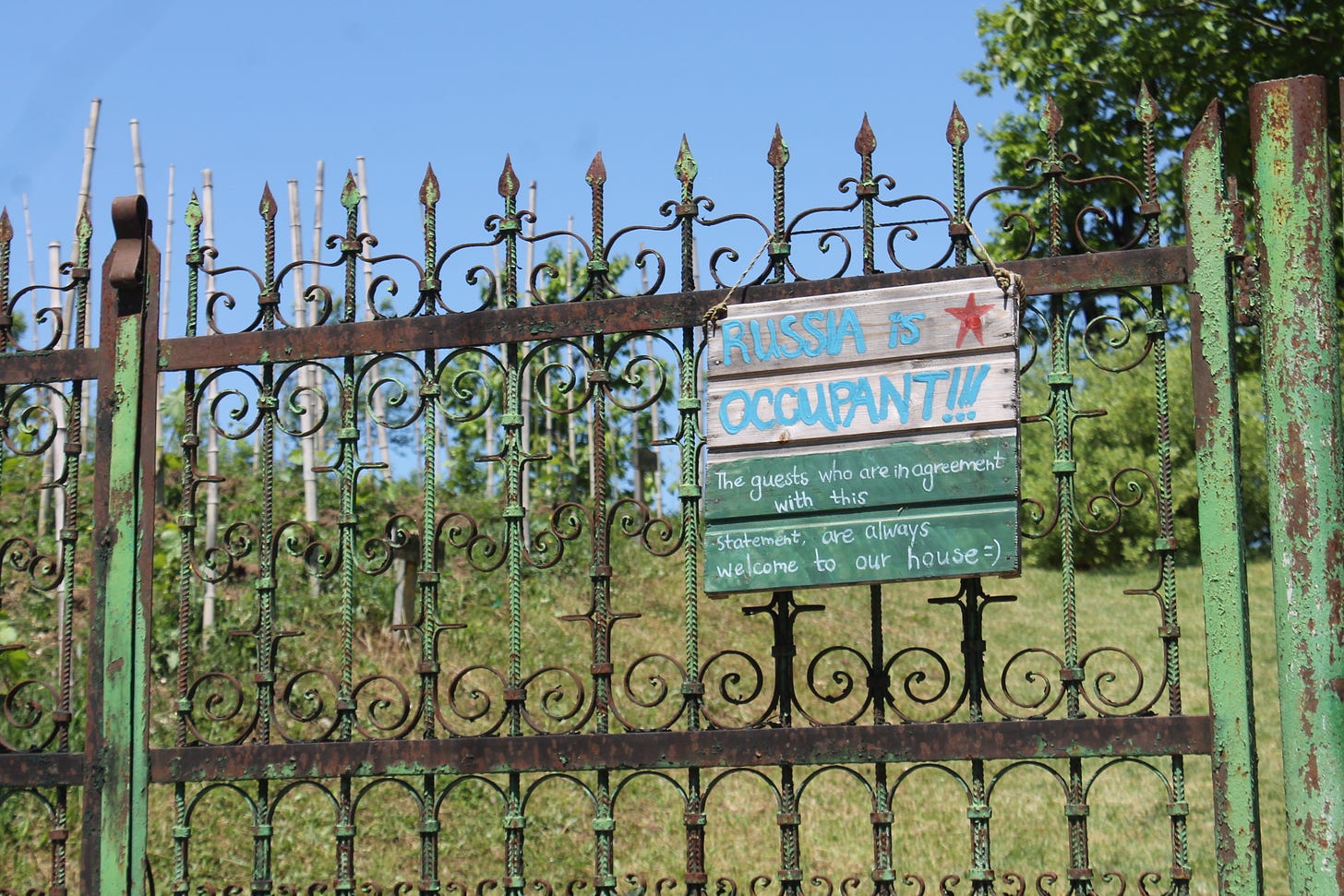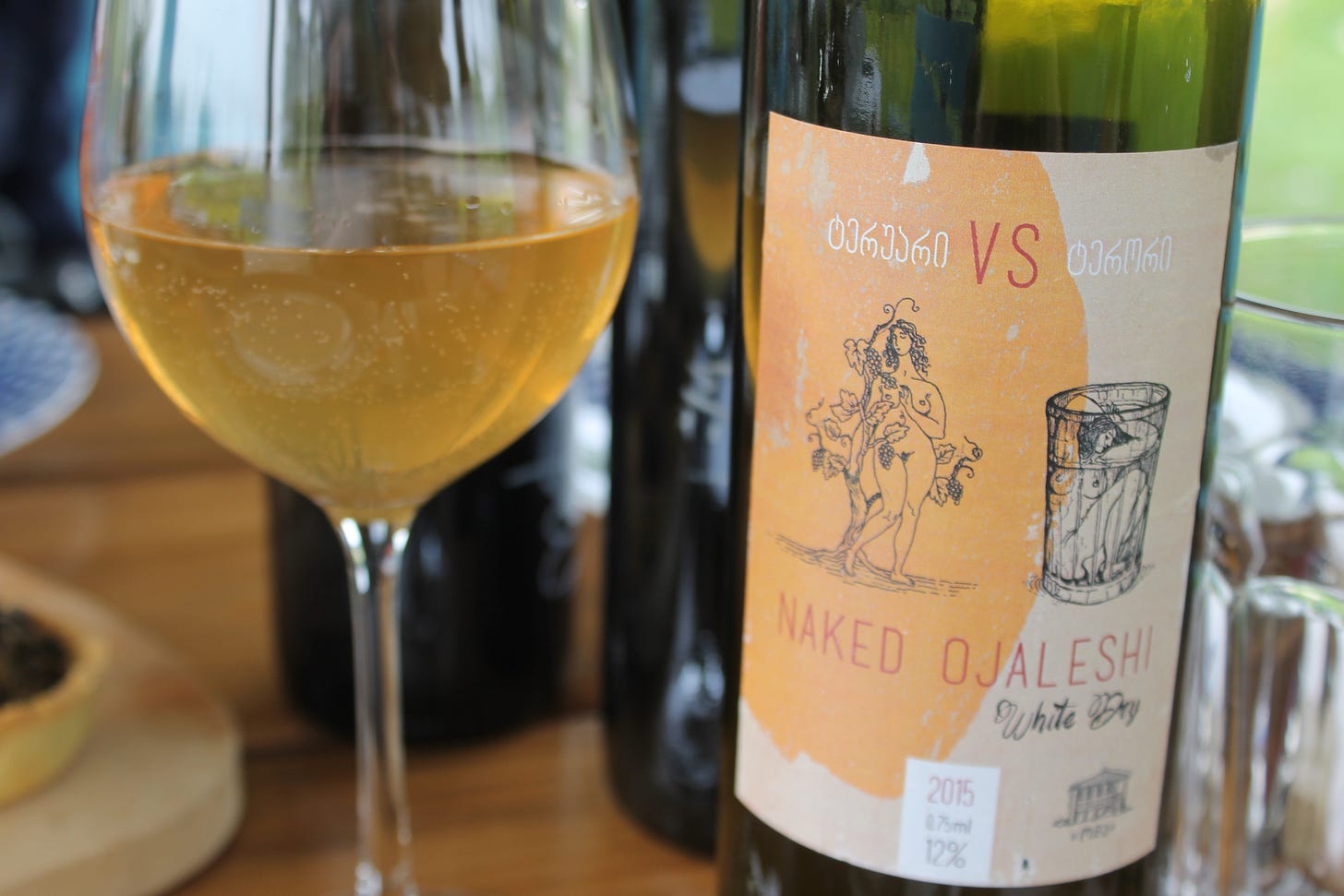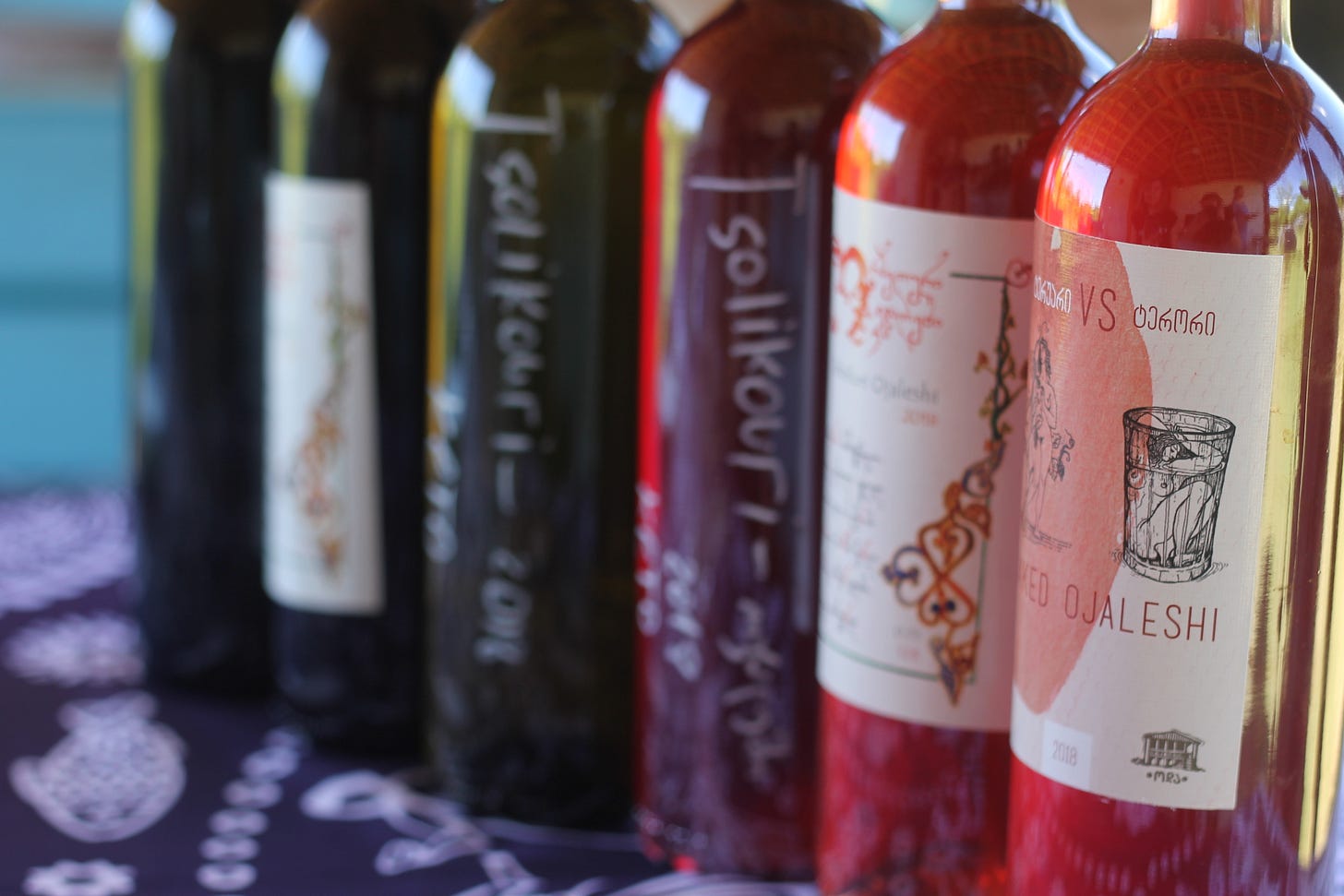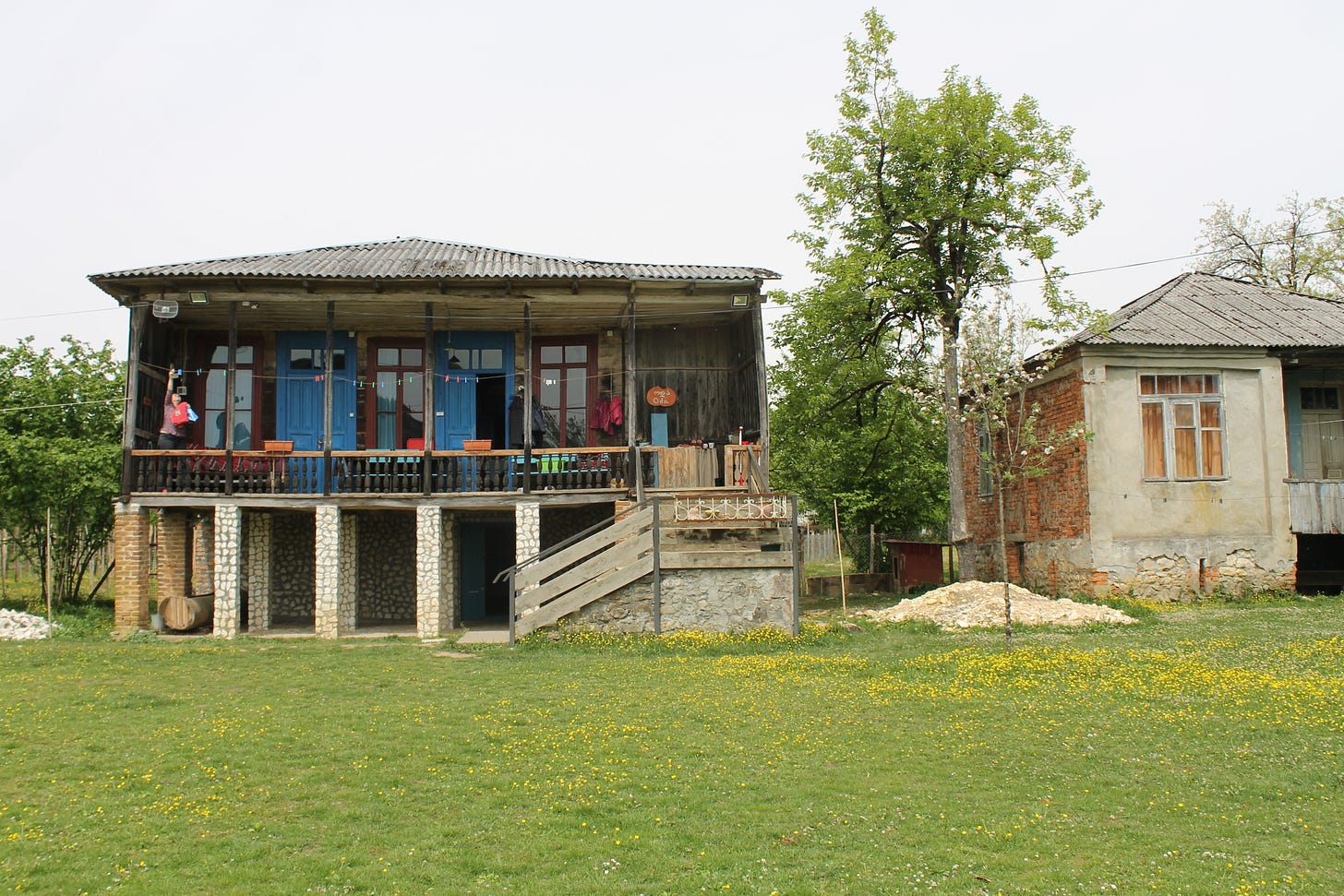Winemaker Keto Ninidze is making a statement with wine and food in Georgia
where wine and radical feminism intersect.
In the early 2000s, there were few women making wine in Georgia; only one, Ana Godabrelidze, at Shumi Winery, was able to make enological decisions. Since 2010, the number of female winemakers in Georgia has grown. There was pushback due to the long-held beliefs that women do not belong anywhere near qvevri, the traditional terracotta vessel with some eight thousand years of history. Women like Marina Kurtanidze, the founder of the Association of Georgian Women Winemakers and the winemaker of Mandili-the first woman-owned and operated winery in Georgia-have been a great source of inspiration to women across Georgia who want to make wine but were unsure how to break through the glass ceiling and somehow leave behind a cultural norm of patriarchal ideas of who can make wine in Georgia. After the fall of the Soviet Union, Georgia struggled to find its identity. Georgian culture is deeply patriarchal, and winemaker and restaurateur Keto Ninidze, inspired by women who made the leap, uses her wine to send a message about Georgian women. Wine and food are part of a cultural identity she strives to preserve in her own unique feminist way.
Keto has a Ph.D. in philology and no background in wine. She didn’t come into the business the way most Georgian men do, through family tradition and mythical grandfathers who always made wine. Instead, she came into it through writing. She first started writing for the Georgian Wine Club in 2012, which meant going to tastings, wine fairs, and meeting winemakers. Then she started to study the culture and science of winemaking. It became very obvious to her that wine and food in Georgia are linked to gender politics; and to the ongoing struggle Georgia has with their northern neighbour, Russia. Georgia gained independence in 1991, but after over two hundred years of Russian and Soviet occupation, the small country of Georgia struggles with its identity in the larger world.
“In 2015, wine and food tourism was growing in Georgia, and I knew when we opened Oda House I wanted to offer food for guests. When we opened we offered regular Georgian cuisine that was offered everywhere, but then I started to research literature, ethnography, and historical documents on food. I started becoming more interested in offering Megrelian and Abkhazian dishes. My passion is to research old recipes, interview old women who retain the knowledge, and create a fusion of old and new.”
During the Soviet period, food and wine production were industrialized and homogenized, putting local and regional traditions at risk. For example, in Samegrelo, the home of Oda House, the Soviets tore out vineyards to grow corn and other introduced crops. Local autochthonous grape varieties were forgotten. Keto hopes to preserve local food traditions and lost varieties from Samegrelo and Abkhazia, so she’s developed a vine library where she can grow them. She is currently doing research for a future book on local cuisine
She is openly feminist and believes it’s vital to use that word. It informs all her decisions. She hires local women to work in the kitchen and to teach traditional recipes of the region.
“In Georgia, women in leading positions in NGOs or organizations avoid the word because of the connotations and stigma attached to the it. I know that feminism doesn’t mean hatred of men, so I’m not worried about the stigma. Wine wasn’t political for me at the beginning. But everything is political, and it became a matter of how I communicated with people. In 2015, I made my own wine, which wasn’t a commercial project. It was just for me, an experiment. When I created the label, femicide in Georgia was a huge issue. I wanted my label to reflect what was going on in Georgia at the time. The women’s organizations and society at large weren’t ready to discuss the issue openly.”
“I explained to my friend who designed my labels what I wanted to convey. She asked me if this was really what I wanted to present – that it is a heavy issue and a societal issue – and maybe the people would want a lighter message. She had a point, but my desire was to convey a powerful message.”
People responded to it in a positive way, but not in Georgia. I was criticized for having a naked woman on the label, mostly by conservative men who said wine is too sacred and you can’t put naked women on the label.”
Even though images of nude women are frequently featured on Georgian wine labels, their bodies are objectified. Keto wanted her wines to remind people of the unnatural power men still hold over women, and through this, to make wine more woman-friendly. The first label image is a naked woman with a vine, and the second one depicts a woman in a cage, representing captivity.
Keto’s wine became a statement, and her winery became the Oda Family Winery. She made her first wine, Naked Ojaleshi, without the traditional skin contact. Georgia has 8000 years of winemaking culture and the practice has always been considered a man’s job. Even though women also made wine, Keto says the men took the credit for it, even when they didn’t do the work.
“Somehow, in Georgia, this image of the naked woman’s body is connected to vineyards,” says Keto. “The fertility and eroticism of women’s bodies are connected to the vine.”
The winemakers who use objectified bodies on their labels couldn’t understand why this would make feminists so angry.
“They said, we just love the female body and its beauty. I really see the people are not ready for this discussion, but my attempt is to contribute and raise awareness about the issues.”
In Georgia, guests often find themselves at a supra, or feast, with a traditional tamada or toastmaster. There is a rigorous code of order. Toasts are made to God and country, and then there is a special toast to women. But women’s power and energy comes strictly from their ability to give birth. There is an entire mythos built around qvevri wine, with the fertility of the woman’s body likened to the vineyard; the wine is made in a qvevri, an earthenware vessel thought to be in the shape of a uterus.
“They make toasts to women,” she says, “While at the same time oppressing and objectifying them.”
Her academic background has deeply informed her wine and food business. At first, she thought it was a disadvantage because she lacked a background in enology. She now feels this helped her.
“My university education helped me think about wine culturally and to communicate with people who love wine. Wine isn’t just about hedonism and having fun and feasts. It’s also a great philosophy that has enriched my literary and linguistic education. I came into wine because I was writing about wine.”
In 2015, Keto and her husband moved with their family to his ancestral home in Martvili, a small rural town in Samegrelo where his grandfather made wine, which is typical for Georgian men. He had many more opportunities at the beginning simply because he had a family with a wine history, and more time to learn about wine.
“I didn’t have a story like his. I think I was known more as Zaza’s wife and eventually as a wine writer. I didn’t know anything about wine. I learned a lot about it because I was writing for the Georgian Wine Club. I was doing research. At the end of 2015, I was inspired to make my own wine. I didn’t have the privilege that my husband had; I didn’t have a father or grandfather who’d taught me to make wine. And in 2015, there were few female winemakers, but it was a real turning point and a crucial starting point for many women in Georgia. Many of us were encouraged by our male family members, which gave us some validation. Younger generations can choose what they want to do now.”
Locally, what Keto is doing is controversial. She constantly argues with men about her project and must reinforce the fact that her husband has no part in her project. Many Georgians in wine perceive her success abroad as related to the fact that she’s a woman rather than a good winemaker – as if it was all just good marketing.
“I was indeed popularized as a female winemaker in Georgia by foreign journalists. In Georgia, society doubts a woman’s ability to make wine, even if they’ve always been a part of winemaking. There is a lack of trust in women winemakers here. People ask me if I really made the wines. They suggest I was involved in the ‘marketing’, but that my husband is the one making the wine. Many women making wine in Georgia have heard the same thing.”
This lack of faith in women’s abilities outside of being wives, mothers, and serving domestic roles drives Keto to continue. She authored a book called A Gently Fermenting Revolution: Women in the Georgian Wine Business, which focuses less on gender and struggle and more on wines – even if there are important stories behind the wines of the female Georgian winemakers breaking the glass ceiling. Keto wanted to focus on their successes as winemakers, because women who make wine are still infantilized in Georgia. The perception is that winemaking is just a hobby rather than a career choice.
Unfortunately, while she doesn’t want to emphasize winemakers’ genders, as long as women are infantilized as they are, celebrating women in wine is still essential. Wine is crucial to the Georgian identity; its history, language, and culture are intrinsically linked to wine, so it makes sense that the Georgian feminist movement is led by a woman with a glass of wine in her hand.
This article is the result of a number of interviews and visits over about five years. Originally I had written it for on of the world’s top publications but the editor kept pushing me to transform it into Soviet trauma porn. I felt uncomfortable about this and discussed it with Keto and decided it was for the best to not go forward as we both feel that Georgia is much more than the post-Soviet identity pushed onto it by Western media. 20% of Georgia is currently occupied by Russia.
Thank you to the Georgian National Tourism Board for sponsoring visits to Oda Family Wine.








Lovely piece, SMG.
Keto's place, wine, and food are so amazing. I am glad she is making (slowly) a difference so that new generations might be more open and welcoming towards the idea of women being able to create something else than babies.